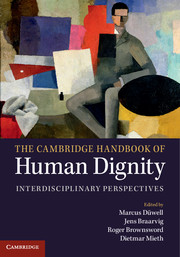Book contents
- Frontmatter
- Contents
- List of contributors
- Foreword
- Why a handbook on human dignity?
- Acknowledgments
- 1 Human dignity from a legal perspective
- 2 Human dignity: concepts, discussions, philosophical perspectives
- Part I Origins of the concept in European history
- Part II Beyond the scope of the European tradition
- Part III Systematic conceptualization
- 19 Social and cultural presuppositions for the use of the concept of human dignity
- 20 Is human dignity the ground of human rights?
- 21 Human dignity: can a historical foundation alone suffice? From Joas’ affirmative genealogy to Kierkegaard's leap of faith
- 22 Kantian perspectives on the rational basis of human dignity
- 23 Kantian dignity: a critique
- 24 Human dignity and human rights in Alan Gewirth's moral philosophy
- 25 Human dignity in the capability approach
- 26 Human dignity in Catholic thought
- 27 Jacques Maritain's personalist conception of human dignity
- 28 Scheler and human dignity
- 29 Dignity and the Other: dignity and the phenomenological tradition
- 30 Dignity, fragility, singularity in Paul Ricœur's ethics
- 31 Human dignity as universal nobility
- 32 Dignity in the ubuntu tradition
- 33 Posthuman dignity
- 34 Dignity as the right to have rights: human dignity in Hannah Arendt
- 35 Individual and collective dignity
- Part IV Legal implementation
- Part V Conflicts and violence
- Part VI Contexts of justice
- Part VII Biology and bioethics
- Appendix 1 Further reading
- Appendix 2 Universal Declaration of Human Rights
- Index
- References
31 - Human dignity as universal nobility
from Part III - Systematic conceptualization
Published online by Cambridge University Press: 05 March 2015
- Frontmatter
- Contents
- List of contributors
- Foreword
- Why a handbook on human dignity?
- Acknowledgments
- 1 Human dignity from a legal perspective
- 2 Human dignity: concepts, discussions, philosophical perspectives
- Part I Origins of the concept in European history
- Part II Beyond the scope of the European tradition
- Part III Systematic conceptualization
- 19 Social and cultural presuppositions for the use of the concept of human dignity
- 20 Is human dignity the ground of human rights?
- 21 Human dignity: can a historical foundation alone suffice? From Joas’ affirmative genealogy to Kierkegaard's leap of faith
- 22 Kantian perspectives on the rational basis of human dignity
- 23 Kantian dignity: a critique
- 24 Human dignity and human rights in Alan Gewirth's moral philosophy
- 25 Human dignity in the capability approach
- 26 Human dignity in Catholic thought
- 27 Jacques Maritain's personalist conception of human dignity
- 28 Scheler and human dignity
- 29 Dignity and the Other: dignity and the phenomenological tradition
- 30 Dignity, fragility, singularity in Paul Ricœur's ethics
- 31 Human dignity as universal nobility
- 32 Dignity in the ubuntu tradition
- 33 Posthuman dignity
- 34 Dignity as the right to have rights: human dignity in Hannah Arendt
- 35 Individual and collective dignity
- Part IV Legal implementation
- Part V Conflicts and violence
- Part VI Contexts of justice
- Part VII Biology and bioethics
- Appendix 1 Further reading
- Appendix 2 Universal Declaration of Human Rights
- Index
- References
Summary
The concept of human dignity, despite its growing importance in legal texts and declarations in the last decades, is notoriously contested in moral philosophy and legal theory. There is no agreement either on what human dignity is or whether one should care much about it. We will show how these questions could be answered given the assumption that the expression ‘human dignity’ is to be read literally, as dignity of humans, where ‘dignity’ is understood as dignity proper, i.e. dignity as it is usually ascribed outside of legal contexts. Dignity proper has played an important role in the history of mankind. It is sometimes also called ‘social dignity’ because it is bound to social relations, or ‘contingent dignity’, on the assumption that having dignity proper is due to contingencies of life and one's own behaviour (in contrast to human dignity as an essential feature of humankind). Dignity proper therefore depends on being treated with respect by others and on being able to present oneself as being of equal dignity in various practical contexts.
Dignity proper is part of an extended conceptual space of evaluative terms which are important in moral life, including, among others, decency, nobility, rank, honour, respect, esteem, grace, decorum, merit, self-respect, coolness, offence, humiliation, degradation, shame. It is obvious, historically, that the concept of dignity proper must have played some role in the development of the concept of human dignity.
- Type
- Chapter
- Information
- The Cambridge Handbook of Human DignityInterdisciplinary Perspectives, pp. 298 - 309Publisher: Cambridge University PressPrint publication year: 2014
References
- 9
- Cited by

